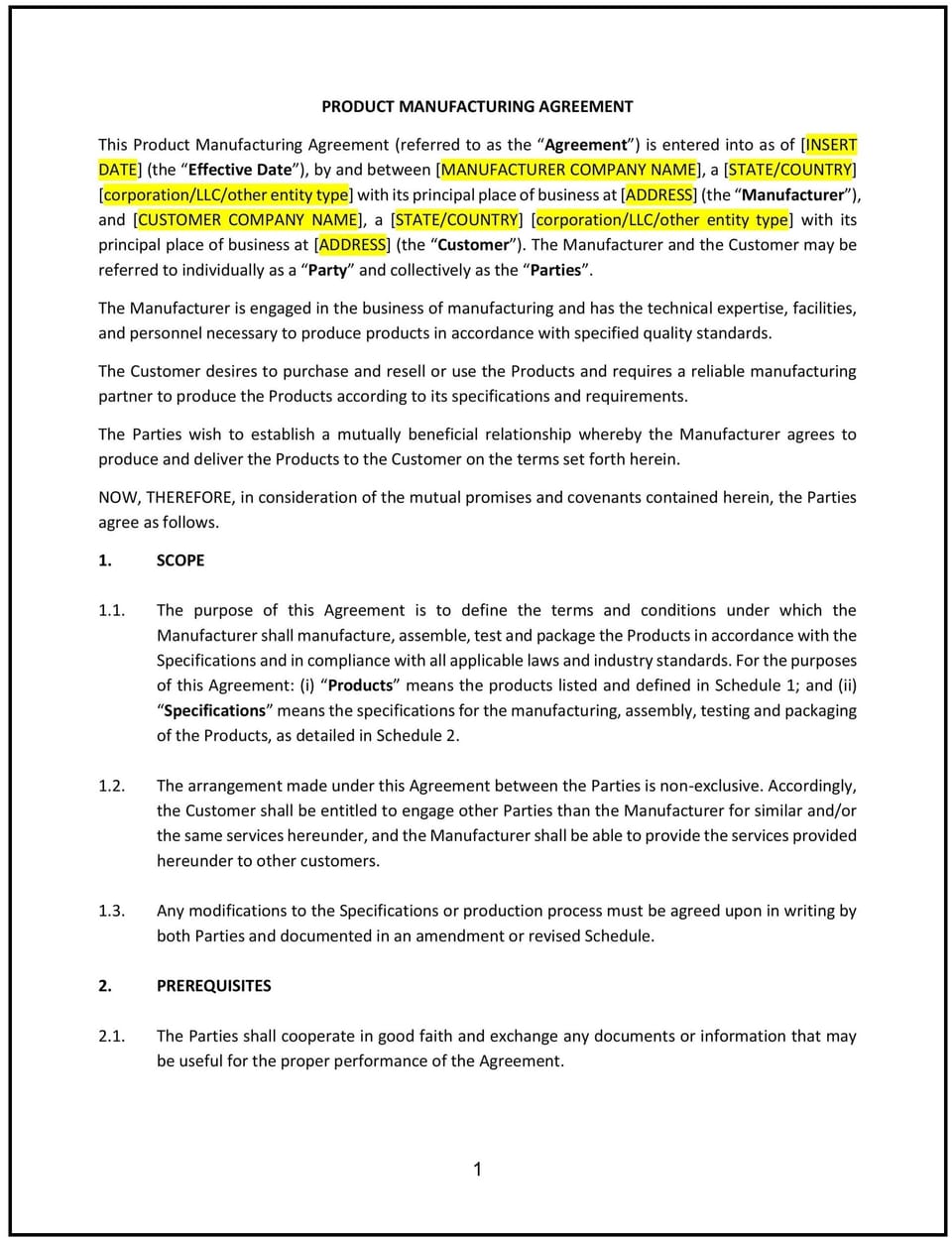Product Manufacturing Agreement (California): Free template

Product Manufacturing Agreement (California)
A Product Manufacturing Agreement is a legal contract between a manufacturer (the "Manufacturer") and a client or company (the "Client"), where the Manufacturer agrees to produce goods according to the Client's specifications. In California, this agreement must comply with state laws regarding contracts, business transactions, intellectual property, and consumer protection. A well-drafted agreement ensures clarity, minimizes disputes, and protects both parties' interests.
For example, a tech startup in San Francisco might enter into a Product Manufacturing Agreement with a manufacturer in Los Angeles to produce custom electronics. A clear agreement specifies product specifications, pricing, timelines, quality standards, and other critical details.
Tips for drafting and maintaining a Product Manufacturing Agreement in California
- Identify the parties: Clearly specify the names, contact information, and roles of both the Manufacturer and the Client.
- Example: “This Product Manufacturing Agreement is entered into by [Manufacturer Name], located at [Address], and [Client Name], located at [Address].”
- Define the product specifications: List the specific products to be manufactured, including materials, dimensions, designs, and any branding or labeling requirements.
- Example: “The Manufacturer agrees to produce the following products: [Description of Products, e.g., custom t-shirts, branded mugs, etc.]. The products shall meet the specifications provided by the Client in Exhibit A.”
- Specify pricing and payment terms: Outline how the Client will compensate the Manufacturer, including deposits, installment payments, and final balances.
- Example: “The Client shall pay a deposit of [Amount]uponsigningthisagreementandtheremainingbalanceof[Amount] no later than [Date/Upon Delivery].”
- Address timelines and deliverables: Detail the schedule for production, delivery, and any milestones.
- Example: “The Manufacturer shall complete production and deliver all products by [Delivery Date] and provide a detailed production timeline to the Client no later than [Date].”
- Include quality standards: Set expectations for product quality, testing procedures, and adherence to agreed-upon specifications.
- Example: “The Manufacturer shall adhere to industry standards and ensure all products meet the quality specifications outlined in Exhibit A.”
- Add intellectual property provisions: Clarify ownership of intellectual property, such as designs, trademarks, or patents.
- Example: “All intellectual property rights related to the products, including designs and branding, shall remain the exclusive property of the Client.”
- Include liability and indemnification: Clarify each party’s liability in case of errors, damages, or breaches of the agreement.
- Example: “The Manufacturer shall not be liable for any delays or issues caused by factors outside their control, such as supply chain disruptions or natural disasters.”
- Include a termination clause: Specify conditions under which the agreement can be terminated by either party.
- Example: “This agreement may be terminated by the Client with [Number] days’ written notice, subject to forfeiture of the deposit.”
- Outline governing law and jurisdiction: Ensure the agreement specifies that it is governed by California law and identifies the appropriate courts for dispute resolution.
- Example: “This agreement is governed by the laws of the State of California. Any disputes arising under this agreement shall be resolved in the courts of [County], California.”
- Include signatures: Both parties must sign and date the agreement to make it legally binding.
- Example: “IN WITNESS WHEREOF, the parties have executed this Product Manufacturing Agreement as of the date first written above.”
Frequently asked questions (FAQs)
Q: What happens if the Manufacturer violates intellectual property rights in California?
A: Violations of intellectual property rights can result in legal action, including injunctions, damages, or termination of the agreement. The agreement should clearly define ownership and restrictions on use.
Q: Can the Manufacturer charge additional fees for expedited production in California?
A: Yes, but only if expedited production and associated fees are explicitly outlined in the agreement. Otherwise, additional charges require mutual consent.
Q: How are environmental regulations addressed in California manufacturing agreements?
A: California has strict environmental laws. The agreement should ensure compliance with regulations like Proposition 65 and waste disposal requirements to avoid penalties.
Q: What happens if the Client rejects a batch of products in California?
A: The agreement should specify rejection criteria and remedies, such as rework, replacement, or refunds. The Manufacturer may also have the right to inspect rejected products to verify claims.
Q: Can the Manufacturer limit liability for defects in California?
A: Liability limitations must be clearly stated in the agreement and are subject to reasonableness. However, California law prohibits waivers of liability for gross negligence or willful misconduct.
Q: Are force majeure clauses enforceable in California?
A: Yes, force majeure clauses are enforceable if they are specific and reasonable. They excuse performance due to unforeseen events like natural disasters, pandemics, or labor strikes, provided the event is beyond the Manufacturer’s control.
This article contains general legal information and does not contain legal advice. Cobrief is not a law firm or a substitute for an attorney or law firm. The law is complex and changes often. For legal advice, please ask a lawyer.


